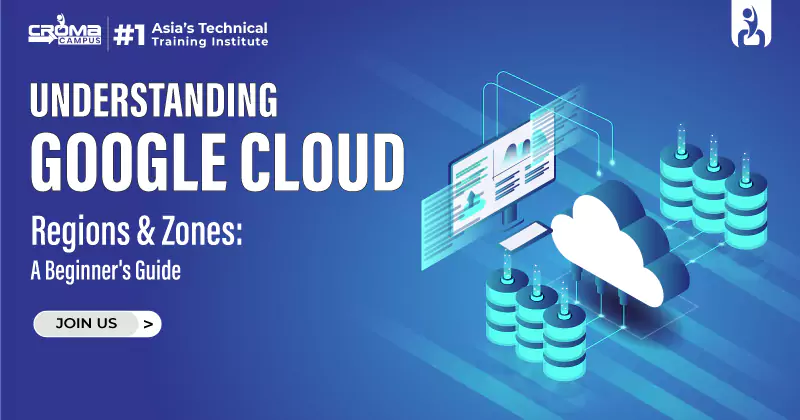Understanding Google Cloud Regions & Zones: A Beginner's Guide
4.9 out of 5 based on 7589 votesLast updated on 23rd Jul 2024 14.79K Views
- Bookmark

A beginner's guide to Google Cloud regions and zones, explaining their structure, purpose, and how they impact cloud service availability and latency.

Introduction
To begin with, Google Cloud is a global leading cloud computing platform that provides businesses with a global network of data centres to host your applications and data.
Regions- These are the geographic independent areas around the world useful for Google's data centres. Along with this, it offers GCP cloud services. At current, there are more than 36 regions across various continents.
What is the Benefit of Regional Distribution?
Regional distribution of resources across different regions can help in enhancing our overall fault tolerance. Along with this, it helps in managing if any outrage occurs in any one region and ensures that your applications & data in other regions remain unaffected. This approach facilitates business continuity and minimizes the downtime.
Why Use Zones?
Using Zones help in minimizing the overall latency and stores the resources that are closest to your users for faster access and improved performance. Along with this, it facilitates disaster recovery and helps in deploying the resources across multiple zones within a region. Thus, resulting in protecting against the localized outages like power failures or natural disasters.
Career Growth After the Google Cloud Course:
Enrolling in the Google Cloud course helps you get in a well-positioned place for exciting career growth. In addition, it solidifies your foundation and provides your hands on experience. Along with this, it strengthens your core skills and teaches you concepts like infrastructure as a service (IaaS), platform as a service (PaaS), and software as a service (SaaS). Furthermore, you can also peruse Google Cloud Certification to validate your skills and demonstrate your expertise to potential employers. Here are the important career paths you can explore after learning Google Cloud.
- Cloud Engineer- They have to work on designing, deploying, and managing cloud infrastructure on GCP. Furthermore, they also leverage the GCP knowledge to build and maintain scalable cloud solutions.
- Cloud Architect- These professionals work on designing and planning cloud solutions that meet an organization's specific needs. They also require understanding of various GCP services.
- DevOps Engineer with Cloud Focus- This job role combines various DevOps practices with cloud expertise. They further have to automate the infrastructure provisioning and deployment using GCP tools.
- Cloud Security Engineer- Their job includes using various robust security features. Furthermore, these professionals are also responsible for securing cloud environments and protecting data on GCP.
- Data Engineer/Analyst with Cloud Skills- These professionals have to store & process large datasets. Along with this, they require necessary data skills with GCP knowledge to work with BigQuery or Cloud Dataflow.
Also, For more information visit here: Microsoft Azure Course Online
Why is Google Cloud So Popular?
Using Google Cloud helps in bringing innovations together from across Google. It provides great scalability & flexibility and helps in handling massive workloads. Along with this, it offers a pay-as-you-go approach which results in eliminating the requirement for any upfront investment. It ensures great reliability and performance and provides users with a global network of data centres. Furthermore, it provides users with reliable cloud services with minimal downtime, ensuring your applications and data are always accessible. Apart from these, below are the significant reasons why Google Cloud is highly popular.
- It takes security very seriously and offers a robust set of security features and compliance certifications.
- GCP provides businesses with numerous AI and Machine Learning Capabilities.
- It facilitates seamless integration with numerous Google services.
- GCP provides open-source support and helps developers who prefer open-source environments.
- Google Cloud facilitates great cost-effectiveness and provides you a pay as you go model.
- It provides innovation and access to cutting edge technologies that can give your business a competitive edge.
You May Also Read These Posts:
GCP Certification for Beginners
Google Cloud Certification Cost
Google Cloud Professional Certification Cost
Google Cloud Platform Components
GCP Associate Cloud Engineer Certification Price
Roles & Responsibilities of a GCP Developer:
GCP developers specialize in all the things related to the Google Cloud Platform. Along with this, it offers users with SaaS, PaaS, and IaaS options. These professionals assure that your organization is getting the most out of this platform. They help with the application development and deployment along with the risk assessment. These professionals also have to manage artificial intelligence and machine learning and work on managing the data. Below are some of the significant roles & responsibilities of an GCP developer.
- Collaborate with stakeholders to understand business requirements.
- Design and architect cloud solutions on GCP that meet those requirements.
- Select appropriate GCP services based on scalability, performance, and cost considerations.
- Develop, test, and deploy cloud applications using GCP tools and services.
- This may involve utilizing tools like Cloud Build for automated builds, Cloud Functions for server less functions, and Kubernetes Monitor and manage deployed applications on GCP, ensuring optimal performance and resource utilization.
- Implement auto-scaling mechanisms to handle fluctuating workloads.
- Regularly review and optimize cloud costs using tools like Cloud Billing and Cloud Monitoring.
- Implement robust security measures to protect applications and data on GCP.
- This includes configuring access controls, identity and access management (IAM), and encryption at rest and in transit.
- Ensure compliance with relevant industry regulations and data privacy laws.
- Stay up-to-date with the latest GCP services, features, and best practices.
- Collaborate with DevOps engineers to streamline the development and deployment process.
Required Skills and Qualifications:
GCP developer is a highly paid and promising career and becoming one can be highly beneficial for your career. To become a GCP developer, you should have a bachelor's degree in any relevant subject. They also require Google Cloud Certification to validate their skills. This career also requires a solid understanding of cloud computing concepts and principles, which can be gained through a Cloud Computing Course Online. Furthermore, you should also have proficiency in programming languages like Python, Java, or Go. Above all, you also have to clear the GCP Interview Questions to start a career in this domain. Below are the necessary skills you should have to become a GCP developer.
- Familiarity with GCP services and tools.
- Experience with infrastructure as code (IaC) tools.
- Working knowledge of Linux operating systems.
- Excellent problem-solving and analytical skills.
- Effective communication and collaboration skills
FAQs
What are Google Cloud Regions and Zones?
- Regions are the Independent geographic areas around the world with Google data centres.
- Zones are the subdivisions within a region that physically separate data centres.
Why use Regions and Zones?
Regions help in improving the fault tolerance by distributing resources across locations. On the other hand, Zones reduce latency by storing resources closest to users.
What are the benefits of Google Cloud?
Google cloud facilitate scalability & flexibility and helps in handling massive workloads. Furthermore, it scales up/down as needed with pay-as-you-go pricing. This tool also offers cost effectiveness and provides businesses a Pay-as-you-go model to ensure that you pay for the resources you use.
Subscribe For Free Demo
Free Demo for Corporate & Online Trainings.
Your email address will not be published. Required fields are marked *






















 Master in Cloud Computing Training
Master in Cloud Computing Training